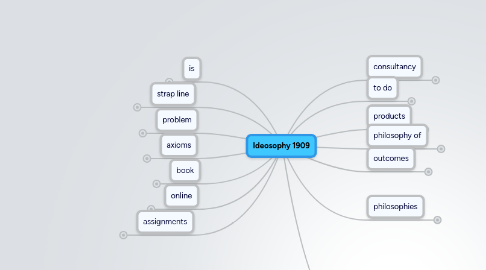
1. is
1.1. the philosophy of making stuff happen
1.2. how to do good life
1.3. a manual for
2. strap line
2.1. change your disposition
2.2. sheer unlikely magnificence of the universe
2.3. how to harness the sheer unlikely magnificence of it all and use it to make stuff happen
2.4. become who you are
3. problem
3.1. lack of happiness
3.2. disposition to negativity
3.3. meaninglessness
4. axioms
4.1. life skills = business skills
4.2. dont be boring and tell the truth
4.3. if you are not using the language then you are not using the concepts
5. book
5.1. stucture
5.1.1. high level
5.1.1.1. what is Ideosophy
5.1.1.2. how to apply it to real life
5.1.1.2.1. enterprise
5.1.1.2.2. education
5.1.1.2.3. relationships
5.1.1.2.4. culture
5.1.1.2.5. the world
5.1.1.3. book is a quasi sequential ordering of mindmap content
5.1.1.4. each section has...
5.1.1.4.1. schematic of location on map
5.1.1.4.2. graphic representation of central concepts
5.1.1.4.3. a set of questions
5.1.1.4.4. an assignment
5.1.1.4.5. an installment of story
5.1.1.4.6. axioms
5.1.1.4.7. 'how to instructions'
5.1.1.4.8. aphorism
5.1.2. part 1
5.1.2.1. the inividual
5.1.3. part 2
5.1.3.1. the organisation
5.1.4. part 3
5.1.4.1. the world
5.2. axioms of book
5.2.1. has high degree of visual content
5.2.1.1. high level architecture
5.2.2. has 1.5 page limit to chapters
5.2.3. gives permission to do non ordinary
5.2.4. tells stories
5.3. content
5.3.1. how to be memorable
5.3.2. how to be persuasive
5.3.3. how to think the unthinkable
5.3.4. how to take risks
5.3.5. how to win arguments
5.3.6. how to beat the odds
5.3.7. how to be interesting
5.3.8. how to know your own mind
5.3.9. how to do good life
5.3.10. how to change your mind
5.3.11. how to do good things
5.3.12. how to make stuff happen
5.3.13. how to shit
5.3.14. how to believe
5.3.15. how to deliberate well and make good judgement
5.3.16. how to be funky
5.3.17. how to read this book [final chapter]
5.3.18. how to appreciate what youve got
5.3.19. how to friend
5.4. format
5.5. story
5.5.1. audience
5.5.2. purpose
5.5.3. message
5.5.4. theme
5.5.5. structure
5.5.6. narrative
6. online
6.1. story collector
6.2. meetup organiser
6.3. twitter feed of axioms
7. assignments
7.1. [activity modules]
7.2. types
7.2.1. liberators
7.2.1.1. eg
7.2.1.1.1. pizza walk
7.2.1.1.2. any kind of performance
7.2.1.1.3. hit something hard
7.2.1.1.4. flash mob
7.2.1.1.5. serendipity amplifyer
7.2.1.1.6. unlikely magificence exercise
7.2.1.2. project mischief
7.2.2. deciders
7.2.2.1. eg
7.2.2.1.1. questioniser
7.2.2.1.2. assumptionator
7.2.2.2. order your life according to the impact it has
7.2.3. producers
7.2.3.1. eg
7.2.3.1.1. creativity booster
7.2.3.1.2. seed bomb
7.2.3.1.3. personal brand statement
7.2.3.1.4. axiomiser
7.2.4. activators
7.2.5. reflectors
7.2.5.1. identify a key defining moment of your life (a meeting or incedent)
7.2.5.1.1. track consequences of it not happening
7.2.6. identifiers
8. consultancy
8.1. creativity
8.1.1. ideation programme
8.2. communication
8.2.1. storytelling
8.3. team development
8.3.1. reeflex
8.3.2. ideation programme
8.4. team building
8.4.1. team match
8.4.2. team engagement programme
9. to do
9.1. create online repository of content (think space)
9.1.1. inc
9.1.1.1. pictures
9.1.1.2. team engagement programme
9.1.1.3. metathink toolkit
9.2. write introductory story
9.3. collect stories of ideosophy
9.4. create high level architecture
9.5. identity iteration
10. products
10.1. brain operating manual
11. philosophy of
11.1. the journey is the destination, the destination is the illusion, the illusion is the journey
11.2. changing state without a goal is recreation
11.3. changing state with a goal is work
12. outcomes
12.1. thought
12.1.1. creative
12.1.2. innovative
12.1.3. deep
12.2. disposition
12.2.1. of novelty
12.2.2. of questioning
13. stories
14. philosophies
14.1. Nietzsche on creativity
14.2. plato on ideas
14.3. hume on ideas
14.4. Aristotle on habit
14.4.1. neuroplasticity
